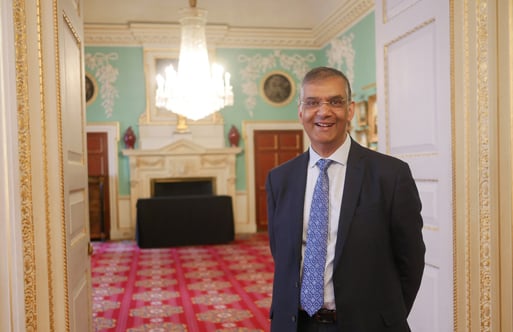‘I had looked forward to this year for a long time - it’s the culmination of 20 years’ work with the Institute. I had planned to spend the year promoting membership in any way I could - raising the profile of the IT profession, the importance of independent accreditation and the importance of having people who are appropriately qualified to design, build, test, run and assure our hidden critical infrastructure.
I was inaugurated on March 11 2020. On March 12 I left London for my home in Somerset for the weekend. And I didn’t go back. Like everyone else, I could not have predicted the year that we have had, nor appreciated that so much of what I took for granted in my life could just stop.
COVID President
So, I’ve been the 'COVID President' and have adjusted my time in office accordingly. I’ve made the most of it and haven’t dwelt (too much) on the things I couldn’t do, though it was a shame not to visit members in Sri Lanka and Mauritius. Being the president involves three main areas of activity - BCS committee work, being an ambassador and talking to members.
The year has been dominated by COVID-19 and much of the early part of my presidency was spent supporting the BCS Executive as it adjusted the day-to-day working of the Institute.
Paul Fletcher, BCS CEO, and his team acted quickly and decisively, protecting jobs, prioritising critical activities and, at the same time, making sure that BCS was at the heart of difficult discussions about the use of technology in the pandemic, commenting in a constructive and incisive way.
I chaired all BCS Trustee Board meetings virtually. I attended various other committee meetings including the Nominations Committee, meetings of the Chairs of Boards and attended BCS Council. As far as possible, I continued with my original intent - to champion professionalism and those activities which would support attracting more members. Being vocal about current issues was part of that.
Partners are important
I have always believed in collaboration and through the year I explored our relationships with organisations like TechUK, IET, City Mental Health Alliance (CMHA).
I also facilitated BCS’ input into the work I do with the Department for Education such as Chairing the T-Level Reform Programme Board and attending the SoS Business Engagement Forum, and the Open University.
Working with others, we reinvigorated STELLAR, the network founded by Liz Bacon for Senior Women in STEM and arranged formal support from BCS including GDPR compliance.
I supported various change initiatives:
- A review which continued to improve the working relationship between Trustee Board and Council
- The excellent initiative Paul Martynenko (former BCS president 2017-2018) is leading to professionalise Data Scientists while working with other professional institutes
- Continuing to push for recognition of digital modules in non-computer science degrees and other qualifications.
In the news
Throughout the year, BCS had an impressive range of interactions with the press and the Public Relations and Policy team have made excellent progress implementing their new strategy which provides original data and analysis on current issues. I was involved in reviewing or commenting on a number of the press announcements and as President, quite often, provided a comment.
There were, for example:
- Surveys and analysis on the NHS contact tracing app
- Comments on the diversity gaps in the IT profession
- Quotes about the use of algorithms to estimate exam grades
- Views on the need to professionalise coding in scientific research
I was also a guest editor for the newly launched New Statesman-backed Tech Monitor site, where I commissioned articles about issues that were close to my heart.
New ways to comment
It’s been fascinating seeing the dialogue emerge through our Basecamp forum for our members on critical and complex issues, with the PR team putting surveys in place and the BCS Society Board working with the Executive to articulate the BCS position.
This year has, perhaps uniquely, provided several opportunities to comment on the way technology is being used in new ways, in extremely challenging and fast-moving situations, as those situations have unfolded.
Alongside these activities, I have provided input to the launch of Fellows Briefings and been a Judge for the Society Medal - a new annual award that recognises an individual's outstanding contribution to making IT good for society.
I have been at the heart of developing the Institute’s points of view and public stance on vital issues.
It's good to talk
I’ve been busy talking to people inside and outside the Institute too. Throughout the year, as an ambassador for a variety of external audiences, I have tried to reach as many members as I could internally. Moving everything online and holding all meetings virtually has allowed me to talk to many people which I have thoroughly enjoyed.
Among other things, I have greatly enjoyed working on:
- Webinars on the impact of COVID-19 on the IT workforce
- T-Levels
- Podcasts and articles for ITNOW
- Made videos for a virtual awards ceremony for the Sri Lankan BCS branch
- For the BCS Virtual Festival of Digital Skills I chaired a panel with Kate Forbes MSP and Sharon Moore MBE, the Chief Technology Officer for Public Sector at IBM, BCS Women Deputy Chair and committee member for Scotland.
I have also had the pleasure of introducing the Karen Sparck-Jones lecture and spoke at the BCS IT Conference.
BCS stronger and more relevant
It hasn’t been the year I expected. But in many ways, it has been a good year. I believe that the Institute has a stronger and more relevant voice in public, a better proposition for members, stronger leadership from the Fellows, and a better sense of community and collaboration internally. Given that all this happened during the COVID pandemic I am confident that these are strong foundations that can be built on next year and in the future.'

















